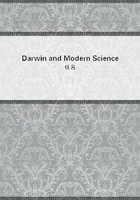
第272章
The view I am about to state is no mere personal opinion of my own. To my present standpoint I have been led by the investigations of such masters as Drs Wundt, Lehmann, Preuss, Bergson, Beck and in our own country Drs Tylor and Frazer. (I can only name here the books that have specially influenced my own views. They are W. Wundt, "Volkerpsychologie", Leipzig, 1900, P.
Beck, "Die Nachahmung", Leipzig, 1904, and "Erkenntnisstheorie des primitiven Denkens" in "Zeitschrift f. Philos. und Philos. Kritik", 1903, page 172, and 1904, page 9. Henri Bergson, "L'Evolution Creatrice" and "Matiere et Memoire", 1908, K. Th. Preuss, various articles published in the "Globus" (see page 507, note 1), and in the "Archiv. f.
Religionswissenschaft", and for the subject of magic, MM. Hubert et Mauss, "Theorie generale de la Magie", in "L'Annee Sociologique", VII.)Religion always contains two factors. First, a theoretical factor, what a man THINKS about the unseen--his theology, or, if we prefer so to call it, his mythology. Second, what he DOES in relation to this unseen--his ritual. These factors rarely if ever occur in complete separation; they are blended in very varying proportions. Religion we have seen was in the last century regarded mainly in its theoretical aspect as a doctrine.
Greek religion for example meant to most educated persons Greek mythology.
Yet even a cursory examination shows that neither Greek nor Roman had any creed or dogma, any hard and fast formulation of belief. In the Greek Mysteries (See my "Prolegomena to the Study of Greek Religion", page 155, Cambridge, 1903.) only we find what we should call a Confiteor; and this is not a confession of faith, but an avowal of rites performed. When the religion of primitive peoples came to be examined it was speedily seen that though vague beliefs necessarily abound, definite creeds are practically non-existent. Ritual is dominant and imperative.
This predominance and priority of ritual over definite creed was first forced upon our notice by the study of savages, but it promptly and happily joined hands with modern psychology. Popular belief says, I think, therefore I act; modern scientific psychology says, I act (or rather, REact to outside stimulus), and so I come to think. Thus there is set going a recurrent series: act and thought become in their turn stimuli to fresh acts and thoughts. In examining religion as envisaged to-day it would therefore be more correct to begin with the practice of religion, i.e. ritual, and then pass to its theory, theology or mythology. But it will be more convenient to adopt the reverse method. The theoretical content of religion is to those of us who are Protestants far more familiar and we shall thus proceed from the known to the comparatively unknown.
I shall avoid all attempt at rigid definition. The problem before the modern investigator is, not to determine the essence and definition of religion but to inquire how religious phenomena, religious ideas and practices arose. Now the theoretical content of religion, the domain of theology or mythology, is broadly familiar to all. It is the world of the unseen, the supersensuous; it is the world of what we call the soul and the supposed objects of the soul's perception, sprites, demons, ghosts and gods. How did this world grow up?
We turn to our savages. Intelligent missionaries of bygone days used to ply savages with questions such as these: Had they any belief in God? Did they believe in the immortality of the soul? Taking their own clear-cut conceptions, discriminated by a developed terminology, these missionaries tried to translate them into languages that had neither the words nor the thoughts, only a vague, inchoate, tangled substratum, out of which these thoughts and words later differentiated themselves. Let us examine this substratum.
Nowadays we popularly distinguish between objective and subjective; and further, we regard the two worlds as in some sense opposed. To the objective world we commonly attribute some reality independent of consciousness, while we think of the subjective as dependent for its existence on the mind. The objective world consists of perceptible things, or of the ultimate constituents to which matter is reduced by physical speculation. The subjective world is the world of beliefs, hallucinations, dreams, abstract ideas, imaginations and the like. Psychology of course knows that the objective and subjective worlds are interdependent, inextricably intertwined, but for practical purposes the distinction is convenient.
But primitive man has not yet drawn the distinction between objective and subjective. Nay, more, it is foreign to almost the whole of ancient philosophy. Plato's Ideas (I owe this psychological analysis of the elements of the primitive supersensuous world mainly to Dr Beck, "Erkenntnisstheorie des primitiven Denkens", see page 498, note 1.), his Goodness, Truth, Beauty, his class-names, horse, table, are it is true dematerialised as far as possible, but they have outside existence, apart from the mind of the thinker, they have in some shadowy way spatial extension. Yet ancient philosophies and primitive man alike needed and possessed for practical purposes a distinction which served as well as our subjective and objective. To the primitive savage all his thoughts, every object of which he was conscious, whether by perception or conception, had reality, that is, it had existence outside himself, but it might have reality of various kinds or different degrees.